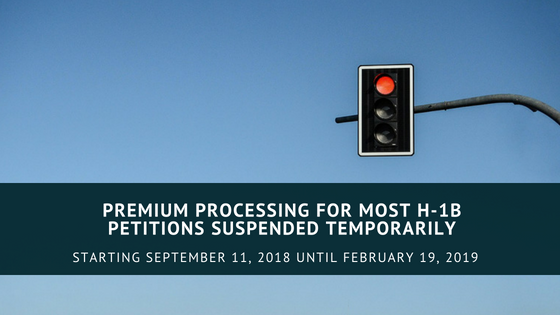USCIS Temporarily Suspends Premium Processing of Most H-1B Petitions
USCIS has announced that effective September 11, 2018, they are temporarily suspending premium processing for most H-1B petitions until February 19, 2019. All H-1B new employment, transfers and amendments filed with the California or Vermont Service Centers are affected. Only H-1B cap-exempt employer (filed with the California Service Center) and H-1B extensions without change with the same employer (filed with Nebraska Service Center) continue to be eligible for premium processing.
Premium Processing Unavailable for H-1B New Employment, Transfer or Amendment Petitions
Starting September 11, 2018 and until February 19, 2019, petitioners will not be able to file Form I-907, Request for Premium Processing Service, for Form I-129, Petition for a Nonimmigrant Worker, for any H-1B petition seeking new employment, transfer or amendment which petitions are to be filed with either the Vermont or California Service Centers. USCIS will continue to accept premium processing for H-1B cap-exempt (such as university or non-profit research) employer petitions which are filed only with the California Service Center. USCIS will also continue to accept premium processing for H-1B petitions seeking a continuation without change of previously approved employment with the same employer which are being processed only at the Nebraska Service Center.
USCIS will continue to accept and to premium process H-1B petitions filed with Form I-907 premium requests prior to September 11, 2018.
Premium Processing Suspension for Cap Cases Extended
Since premium processing for H-1B “cap” cases was already suspended, this announcement essentially means that H-1B cap petitions cannot be upgraded after early September, as we had anticipated. F-1 OPT holders who are running out of “cap-gap” time (see our article) should consider seeking other ways to try to expedite their cases and to avoid or minimize the time without employment authorization.
Reasons for Temporarily Suspending H-1B Premium Processing
The rationale behind this temporary suspension of the premium processing option for most H-1B petitions seems to be heavy demand and high number of H-1B filings together with the fact that regular H-1B case processing times have been steadily going up with some H-1B petitions taking more than ten months to review and process.
Most H-1B Petitions Filed On or After September 11, 2018 are Affected
We should highlight one more time that the temporary suspension of premium processing applies to most H-petitions, including new employment, transfers and amendments which are filed on or after September 11, 2018. Other types of petitions filed on Form I-129 (such as TN, O-1, L-1, among others) are not affected and continue to have the premium processing option. Similarly, H-1B petitions filed prior to September 11, 2018 should be able to request premium processing.
Premium Processing Fee Refunds Will be Offered to Affected Cases
For H-1B petitions filed on or after September 11, 2018, USCIS will reject the premium processing component assuming the premium processing fee is in the form of a separate filing fee check. If a case includes the all filing fees, including the premium processing fee, in a single check, USCIS will reject the entire filing. For H-1B premium processing cases filed prior to September 11, 2018, USCIS will refund the premium processing fee if USCIS is unable to act on the case within 15 calendar days of the date of filing.
What Else May Be Affected?
Given this unexpected announcement, it is likely that the USCIS processing timelines across the board may increase, at least at USCIS Service Centers which are dealing with H-1B petitions (California, Nebraska and Vermont). We have observed increased in processing times across the board for almost all types of USCIS filings and we urge proper planning and early filing to avoid problems caused by any processing delays and the lack of the premium processing option.
Transfers and Amendment Filings
We should highlight that H-1B petitions seeking change of employer or amendment of the terms of employment where the beneficiary is in the United States in valid H-1B status would allow continued employment under the terms of the newly-filed and pending H-1B petition. For beneficiaries who are abroad or who need to travel internationally, however, the suspension of premium processing will introduce significant challenges.
Alternatives for Faster Processing
The government has retained the option to have a regular processing H-1B case be granted “expedited” review based on a set of criteria. According to USCIS, petitioners may submit a request to expedite an H-1B petition if they meet any of the expedite criteria. USCIS will expect the petitioner to demonstrate that they meet at least one of the criteria and such request should be documented and supported by evidence. USCIS warns that the decision to expedite a case is discretionary and made on a case-by-case basis.
Conclusion
While this suspension will no doubt affect a number of H-1B applicants, there are ways to plan for this suspension and pursue alternatives and backup options. We hope that the positive news of this development would be a general decrease in processing times across all H-1B cases (perhaps even across all USCIS types of cases).
We urge H-1B employers who have filed or are planning to file H-1B petitions, including new employment, transfers or amendments, to plan carefully for the fact that H-1B petition adjudication will take longer without premium processing.
Please do not hesitate to contact us if we can be of any help in preparing for this unanticipated H-1B premium processing disruption of service. Please feel free to subscribe to our free weekly newsletter to obtain developments on this and related topics.
Related News and Articles
The Capitol Immigration Law Group has been serving the business community for over 15 years and is one of the most widely respected immigration law firms focused solely on U.S. employment-based immigration. Disclaimer: we make all efforts to provide timely and accurate information; however, the information in this article may become outdated or may not be applicable to a specific set of facts. It is not to be construed as legal advice.

